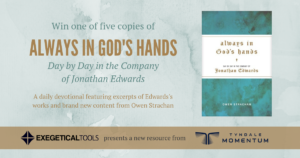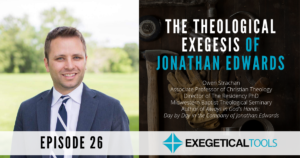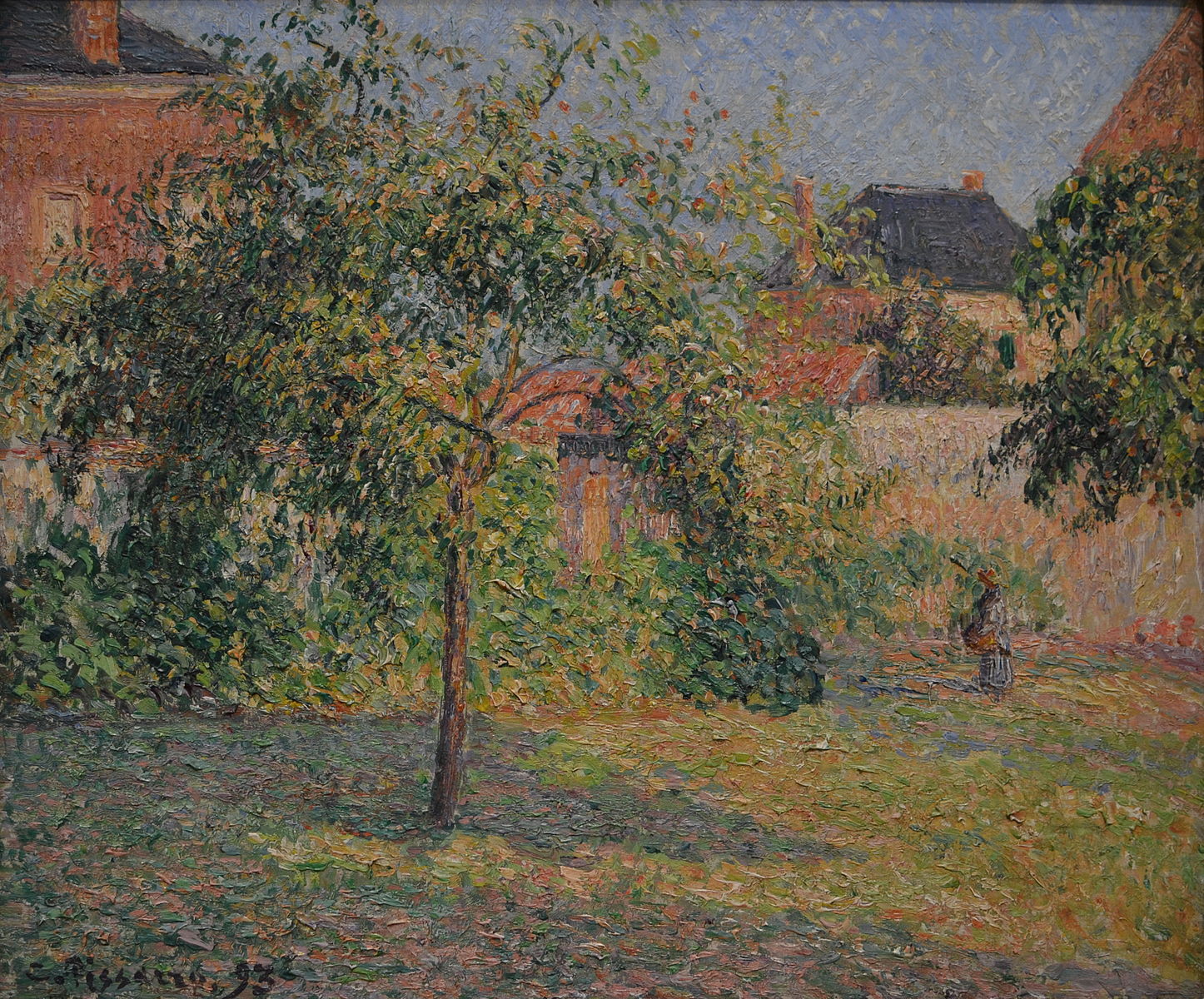A Scripture-Saturated Mind
A mind saturated with Scripture and a heart ablaze with the glory of God – this is an apt description of Jonathan Edwards, one of America’s greatest theologians and a major contributor to a new daily devotional.
Jonathan Edwards took God seriously, as many teenagers in U.S. public schools can attest from their required reading of Edwards’s famous sermon, “Sinners in the Hands of an Angry God.” He had no qualms declaring hard truths.
Edwards, then, took Scripture seriously. Though his Puritan preaching doesn’t quite resemble today’s expositors (as a recent episode of Tool Talk discusses), he nonetheless knew and cherished God’s Word.
This is evident in the new Edwards devotional, Always in God’s Hands: Day by Day in the Company of Jonathan Edwards (Tyndale House). Owen Strachan, associate professor of Christian theology at Midwestern Baptist Theological Seminary, has been soaking up Edwards’s works for years, and he wants earnest Christians everywhere to learn from the theologian’s thought.
With an excerpt from Edwards, historical and devotional content from Strachan, and a passage of Scripture for meditation, every day can be a window into the Puritan’s world and, through Edwards, to Christ.

Enter to win a copy of the Edwards devotional through the Exegetical Tools Twitter or Facebook. Five winners will be announced on Friday, 11/30/18, at 5 PM CST.
The Apple Tree and All of Scripture
So what do these excerpts reveal about Edwards’s knowledge of Scripture? Let’s just take the entry for April 13th as an example.
From Edwards’s letters and personal writings comes an excerpt from a letter to Lady Mary Pepperell. The first excerpt from this letter is produced on the entry for April 12th, where Strachan fills us in on the situation: Pepperell’s husband had passed away, and Edwards wished not only to express his sympathy but to encourage the newly-widowed woman.
Strachan writes:
“Though Edwards had polite relationships with the New England aristocracy, he did not merely extend his sympathies to Lady Pepperell. Instead, he lifted her eyes to Christ and urged her to ‘rest in him.’ Even the wealthiest among us cannot help but be ‘deprived’ of that which we love in the world, but there is ‘infinite glory’ in Christ.”
Though a deep well of theological insight, Edwards clearly felt burdened to show brotherly compassion. What better way to do this than to expound the Scriptures? So Edwards went on to weave together a warm garment of biblical metaphor:
“Having found him who is as the apple tree among the trees of the wood, we may sit under his shadow with great delight and his fruit may be sweet to our taste. Christ told his disciples that in the world [they] should have trouble, but says he, ‘In my ye shall have peace.’ If we are united to him, our souls will be like a tree planted by a river that never dieth. He will be their light in darkness and their morning star that is a bright harbinger of day. And in a little [while], he will arise on our souls as the sun in full glory. And our sun shall no more go down, and there shall be no interposing cloud, no veil on his face or on our hearts, but the Lord shall be our everlasting light and our Redeemer, our glory.”
This personal letter is packed to the brim with biblical references as Edwards exalts Christ in all Scripture:
Edwards presents Jesus as the better husband to this grieving widow. Just as the Shulamite proclaimed of her beloved, believers can proclaim of Christ: “As an apple tree among the trees of the forest, so is my beloved among the young men. With great delight I sat in his shadow, and his fruit was sweet to my taste” (2 Song 2:3 ESV). Jesus is fairer.
Edwards insists that the words of comfort Jesus spoke to His disciples before He left them were for the distressed believer of any age: “I have said these things to you, that in me you may have peace. In the world you will have tribulation. But take heart; I have overcome the world” (John 16:33). Jesus is ever-present.
Edwards assures that Jesus is the fulfillment of the promises of the Psalms: The believer “is like a tree planted by streams of water that yields its fruit in its season, and its leaf does not wither. In all that he does, he prospers” (Psalm 1:3). Jesus is life-giving.
Edwards proclaims the heavenly hope of Jesus’ return: Believers “will see his face, and his name will be on their foreheads. And night will be no more. They will need no light of lamp or sun, for the Lord God will be their light, and they will reign forever and ever” with Jesus, “the bright morning star” (Rev 22:4,5,16). Edwards recognized the echoes of the Old Testament in this passage, so he also made reference to Isaiah 60: “The sun shall be no more your light by day, nor for brightness shall the moon give you light; but the Lord will be your everlasting light, and your God will be your glory” (Isa 60:19). Jesus is glorious.
Edwards packs in even more oblique references to Scripture. Note the allusions to Romans 6 (“united to him”), Hebrew 10 (“in a little [while]”), Acts 1 (“interposing cloud”), and 2 Corinthians 3 (“no veil”).
But what else could we expect?
Edwards truly had a mind saturated with Scripture—and it saturated even his personal correspondence with a grieving widow. Edwards truly had a heart ablaze with the glory of God—and it exalted Christ in all the Bible.
Seeking Christ With Edwards
What might we learn of Christ from Edwards? We certainly ought not forsake our daily reading of the Scriptures to read Edwards instead, and he wouldn’t want us to. But what might we gain from our reading of the Scriptures having also spent time with Edwards?
If you seek the glory of God in the Son of God by the Spirit of God through the Scriptures, there are few better companions than Jonathan Edwards.
If you seek a mutual friend to introduce you to Edwards, there are few better guides than Owen Strachan in Always in God’s Hands.
But most of all, there is no better treasure than Christ.
As Strachan concludes:
“We savor the sweetness and beauty of Christ, thankful that we have found the apple tree—the choicest one—among all the trees of the wood.”
How will you sit under His shadow today?

Listen to an interview with Owen Strachan about Always in God’s Hands and the Christ-centered exegesis of Jonathan Edwards.

